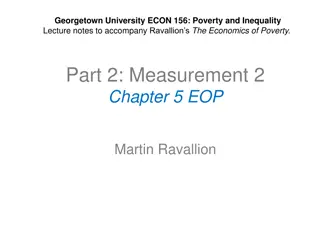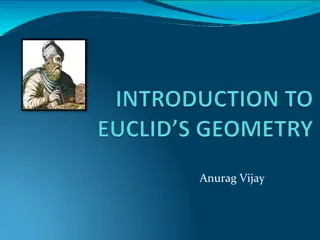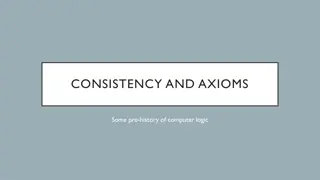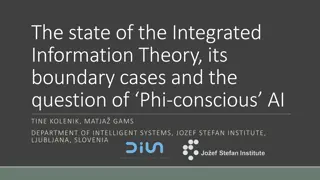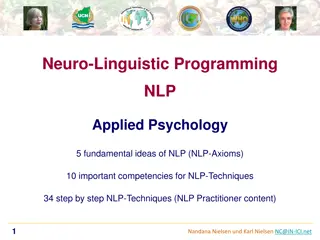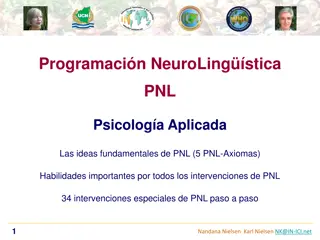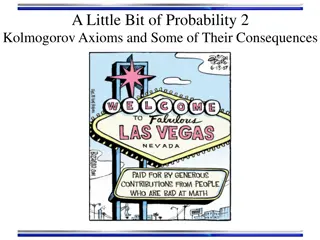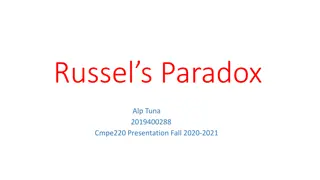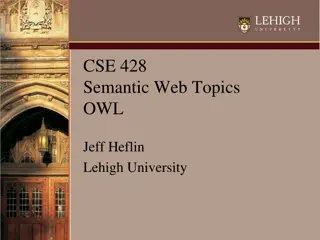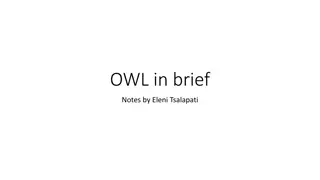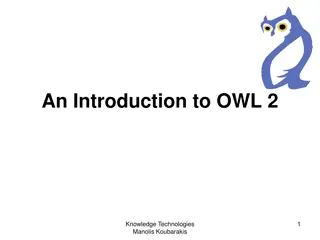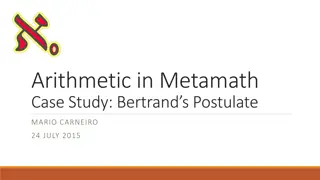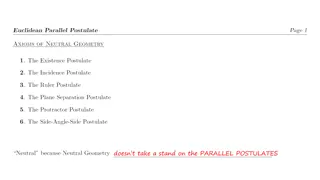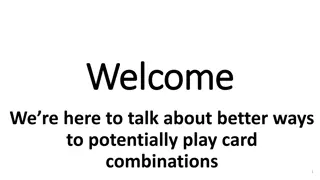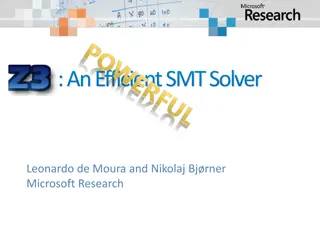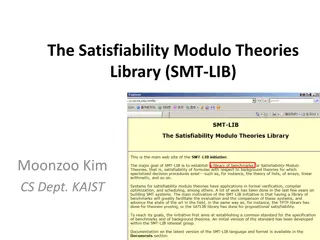Understanding Inequality: A Dive into the Gini Index and Axioms of Measurement
Exploring the core concepts of inequality measurement, this content delves into the essential properties a measure of inequality should have, including the five standard axioms. It discusses the Gini index in detail, elucidating its formula and graphical representation. An informative guide for comp
3 views • 61 slides
Understanding Euclid's Geometry: The Fundamentals Explained
Euclid, known as the Father of Geometry, introduced the principles of geometry in Egypt. His work included definitions, axioms, and postulates that laid the foundation for geometric reasoning. Euclid's Five Postulates are crucial in understanding the basic concepts of geometry. This article provides
1 views • 12 slides
Insights into Voting Systems and Arrow's Impossibility Theorem
The content delves into various voting systems, including the conditions necessary for a voting system to be fair and democratic. It discusses the challenges faced by democratic voting systems, such as Arrow's Impossibility Theorem, which states that no voting system can satisfy all desirable axioms
0 views • 20 slides
Evolution of Computer Logic: From Axioms to Natural Deduction
Delve into the fascinating pre-history of computer logic, starting from David Hilbert's foundational problems in mathematics to the development of the Dedekind-Peano axioms for natural numbers. Explore Hilbert's finitist consistency program and the evolution of logic systems from Hilbert's axioms to
0 views • 26 slides
Exploring the Integrated Information Theory and Conscious AI
Delve into the Integrated Information Theory (IIT) and its impact on understanding consciousness, including its correlation with artificial intelligence. The IIT posits key axioms and postulates to define consciousness, exploring boundary cases and implications for AI development.
0 views • 11 slides
Mastering Neuro-Linguistic Programming (NLP) Fundamentals and Techniques
Explore the core concepts of Neuro-Linguistic Programming (NLP) through a comprehensive guide covering essential NLP axioms, competencies, and step-by-step techniques. Authored by Prof. Nandana Nielsen and Prof. Karl Nielsen, this resource introduces the origins of NLP, key principles, and practical
0 views • 52 slides
Comprehensive Overview of Neuro-Linguistic Programming (NLP) Fundamentals
Dive into the core concepts of Neuro-Linguistic Programming (NLP) with a focus on the essential ideas, skills, and interventions. Learn about the 5 key axioms, important techniques, and step-by-step instructions for various NLP interventions. Developed by Nandana Nielsen and Karl Nielsen, this guide
0 views • 52 slides
Understanding Algebra: Operations, Patterns, and More
Explore the fundamental concepts of algebra through sets, operations, patterns, axioms, identities, examples, inverses, groups, modular arithmetic, and matrices. Delve into the world of square matrices and gain insights into various algebraic structures.
0 views • 20 slides
Understanding Kolmogorov Axioms of Probability and Their Consequences
Exploring the fundamental principles of probability through Kolmogorov Axioms, this content delves into the rules that govern probabilities of events, such as non-negativity, total probability, and the addition rule. Handy consequences like the probability of complements, unions, and intersections a
1 views • 8 slides
Understanding Russell's Paradox: A Dive into Set Theory
Delve into Russell's Paradox, a foundational issue in mathematics arising from naive set theory. Explore how the paradox challenges the notion of definable collections as sets, ultimately leading to the development of advanced solutions in set theory such as the ZFC axioms and the Axiom of Separatio
0 views • 6 slides
The Deceptive Beauty of Discounted Expected Utility: A Study on Optimizing Over Multiple Components
This study delves into the intricate world of discounted expected utility, exploring various axioms, generalizations, variations, and applications. It questions the row-first versus column-first approach and discusses preferences over outcome streams and lotteries. The investigation leads to profoun
0 views • 44 slides
Understanding Semantic Web Modeling with OWL and Ontologies
Explore the fundamentals of Semantic Web modeling through OWL and ontologies, covering topics like property chain axioms, equality vs. inequality in URIs, sets of distinct individuals, and all values from constraints. Learn how these concepts shape the representation and relationships within linked
0 views • 15 slides
Understanding Web Ontology Language (OWL) in a Nutshell
Web Ontology Language (OWL) is a powerful tool for ontology modeling, allowing the creation of complex structures and relationships. OWL encompasses entities, expressions, and properties, enabling detailed descriptions of domains through axioms. The language supports both object and data properties,
0 views • 39 slides
Introduction to OWL 2 Knowledge Technologies
Explore the basics of OWL 2, the Web Ontology Language, through a presentation by Manolis Koubarakis. Learn about OWL 2's structural specification, functional syntax, semantics, and profiles. Delve into the terminology of OWL 2, understanding individuals, classes, properties, expressions, and axioms
0 views • 190 slides
Exploring Metamath: A Computer Language for Mathematical Proofs
Metamath is a computer language designed for representing mathematical proofs. With several verifiers and proof assistants, it aims to formalize modern mathematics using a simple foundation. The Metamath-100 project is focused on proving a list of 100 theorems, with significant progress made in prov
0 views • 17 slides
Understanding Different Geometries and Parallel Postulates
Explore the realms of Euclidean, Hyperbolic, and Elliptic geometries along with their unique characteristics, axioms, and the implications of the parallel postulates. Delve into the distinctions between these geometries and the intriguing concept of mixing Euclidean and Hyperbolic geometries within
0 views • 6 slides
Mastering Bridge Play: Strategies for Maximizing Card Combinations
Explore advanced tactics in Bridge play focusing on current suit tactics, standard signals, and strategies to maximize tricks. Learn about key axioms and exceptions that can influence your gameplay decisions in various contract scenarios.
1 views • 29 slides
Sustainability Axioms and Good Q@Is: Understanding Social and Environmental Stewardship
The Heinberg's Axioms outline the essential principles of sustainability, emphasizing responsible resource management and the need for balanced growth. It highlights the importance of using renewable resources at a slower pace than they are replenished and reducing the use of non-renewable resources
0 views • 9 slides
Understanding Z3: An Efficient SMT Solver
Z3 is an efficient Satisfiability Modulo Theories (SMT) solver that integrates various decision procedures for program analysis, verification, and test case generation. It supports linear arithmetic, bit-vectors, uninterpreted functions, quantifiers, and offers an extensive API for different program
0 views • 16 slides
SMT-LIB: The Satisfiability Modulo Theories Library Overview
The Satisfiability Modulo Theories Library (SMT-LIB) is a comprehensive tool for formal reasoning in various supported theories such as arrays, bit vectors, and integer and real arithmetic. It provides a wide range of supported sublogics for precise specifications and verifications. Moonzoo Kim, fro
0 views • 14 slides
Algebraic Complexity and Equational Proofs in Arithmetic Formulas
Explore the intricacies of polynomial identity testing (PIT), equational proofs, and arithmetic formulas in the context of algebraic complexity. Learn about the minimal number of operations needed to compute the zero polynomial and derive new identities using derivation rules and axioms in polynomia
0 views • 39 slides
Understanding Mathematical Proofs and Concepts
Explore the world of mathematical proofs through chapters 4, 5, and 6. Delve into terminology, theorems, definitions, divisors, and accepted axioms used in mathematical reasoning. Discover the logic behind proofs and various methods employed in establishing the truth of mathematical statements.
1 views • 101 slides
